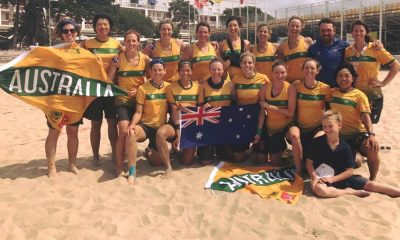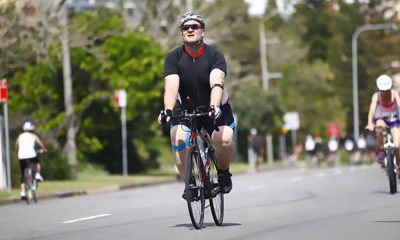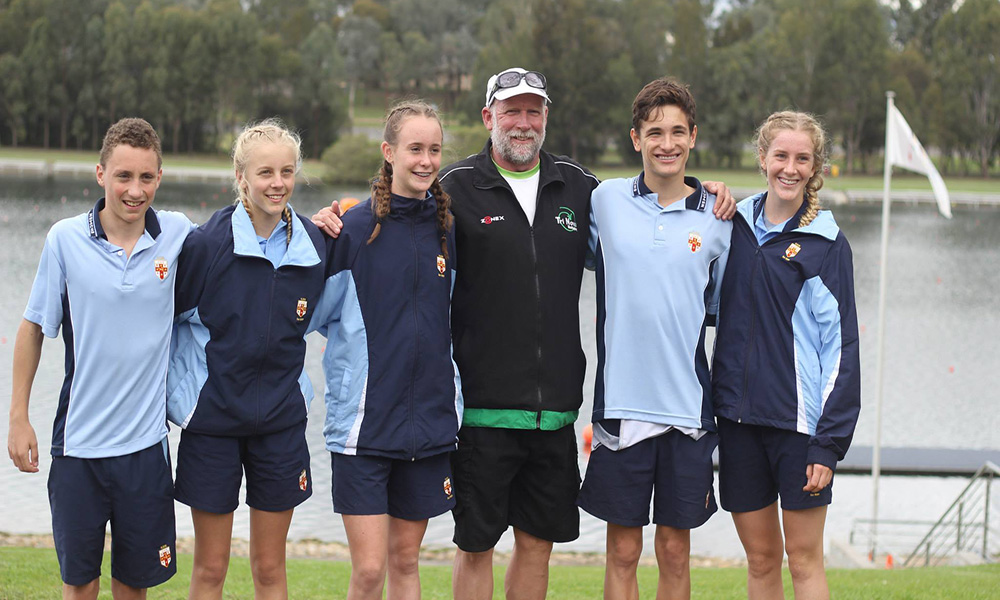
A 3.64 kilometre swim, 180.25km ride and a 42.2km marathon – a daring course of 140.6 cumulative miles, or just over 226kms, of ocean, hills and hard roads.
That’s the Ironman triathlon.
It’s nine days after the 2017 Port Macquarie Ironman and Rod Cook is settled on the grass at the newly refurbished Fearnley Dawes Athletics Centre, while more than a dozen of his athletes jog past.
Stretching his legs as he speaks, legs that only a little over a week earlier had carried him through his 10th Ironman in 20 years, Cook recalls the first one he ever competed in.
His start in the sport came just like it does for many – watching someone else compete before deciding to just give it a crack.
For Cook, it was a co-worker who competed in the Gloucester Mountain Man.
As for his first Ironman, the story went much the same way.
“It was in 1996 I think. We had been doing triathlons for a couple of years, done a couple of halves and again we went up to watch the Ironman and just said ‘oh we are going to do this next year’,” Cook said with a grin, going on to explain that they very much stumbled their way through the preparation for what many would deem as the most challenging race of their lives.
“We actually got coached for the next year,” he laughed.
“Went back and took a couple of hours of our times and went a little bit better.”
The year before he had acquired his level one coaching certificate.
Having always been interested in working in gyms as a personal trainer previously it seemed like a natural progression.
It wasn’t until the early 2000s that it got serious, with Cook progressing to a level two coach and taking over the Hunter Academy of Sports’ triathlon program in 2002.
It was a program he would lead for the next half a decade, helping mentor and coach an abundance of triathlon’s brightest talent.
One such athlete was Newcastle Olympian and ITU athlete Brendan Sexton.
 Supplied
Supplied Brendan Sexton after winning the ITU Oceania Championship in 2012, which helped him gain the third spot in Australia’s triathlon team for the London Olympics.
“Rod was my first triathlon coach. He pretty much introduced me to the basics of the sport,” Sexton said.
“He saw me go from someone who was quite grassroots and very novice, to someone who was medalling a junior national level and making world championship rosters.
“He was first to see some talent in me and encourage me to actually work and get something out of it.”
The Olympian, who now works as the junior development coach for Triathlon NSW out of Wollongong, spoke strongly of his former junior coach.
“Rod’s general nature is something that has always stuck with me and I think was probably a reason for me initially wanting to take triathlon more seriously,” Sexton said.
“That’s something that has really stuck with me right through to Olympic level triathlon.
“I have always referred back to the attitude that Rod had to make sure I was enjoying what I was doing while also making a career out of it.”
Two of Rod’s current top juniors, Lorcan Redmond and Hamish Longmuir, also sang his praises.
“Rods a fantastic coach,” Redmond, the younger of the pair, said as they sat trackside post running session.
“It goes to say that he’s been there done that – done everything the sport has to offer and has just nurtured both of us through our youth and junior careers.”
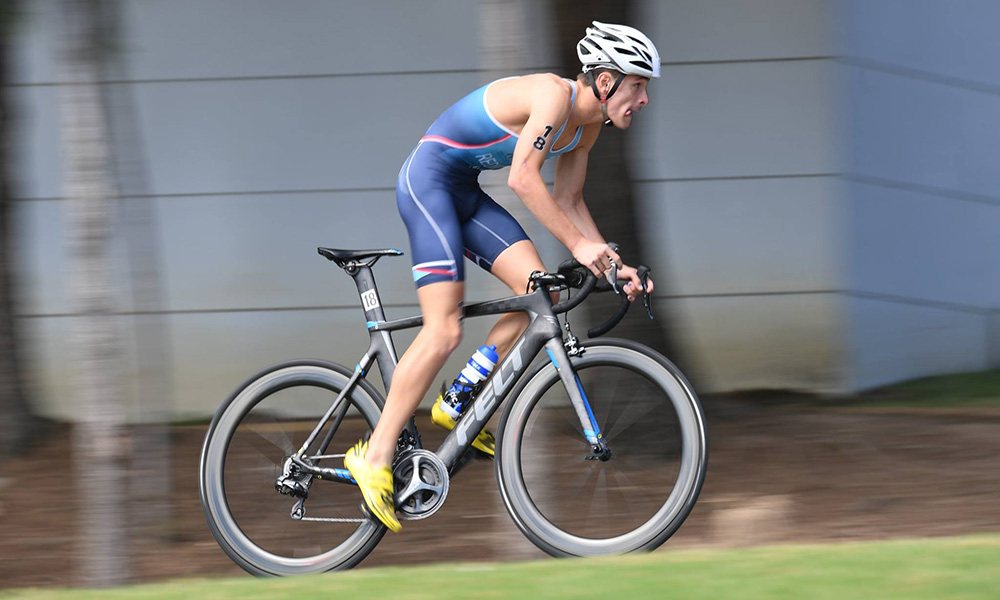 Lorcan Redmond
Lorcan Redmond Lorcan Redmond competing in his fourth School Sports Australia Triathlon in April 2017.
Longmuir added that Cook has coached and mentored athletes that have gone on to compete at the Olympics including Sexton and Aaron Royal.
“He knows his stuff and hopefully, in time, we can get to that level,” Longmuir said.
Between Redman and Longmuir, they have represented at almost every level that triathlon has to offer. From local club races to being named in the Australian team for world championships.
It’s these grassroots athletes that Cook values most as a coach, the ones you get to take from basically nothing.
Looking out at the track Cook recalled taking Redman for his first ride on a road bike, joking about how he had his first crash not even five minutes later.
“It’s good to see the progression from that beginners level up to being a multiple time Australian champ,” he said.
“It’s also good to see other athletes that aren’t necessarily world beaters who face setbacks and injuries, just keep plugging away and then all of a sudden it all starts to click and the results come.”
In 2007 Cook completed the race he was proudest of.
During the Foster Ironman, while on track to finish with a pretty good time, his rear wheel got caught on his gear changing mechanism, ripping it from his bike frame ruling the machine that had already carried him 175km unrideable.
He was still 5km out of town.
“I ran in my socks all the way into town before I started the marathon,” he said.
“I still finished, I really just jogged around for that 42. But I finished the race.
“That was one I look at more and say that was a bigger achievement that many of the other races I’ve done.
“It’s something I’m really proud of finishing.”
In 2009 he would overcome an even bigger hurdle.
After struggling through mental health problems Cook saw no light at the end of the tunnel and at his lowest point attempted to take his own life.
In an interview with Triathlon NSW Cook spoke of how he didn’t recall much of the night in question saying that he just remembered that “I had sunk into this big black hole that looked like I would never climb out of”.
What happened from there was nothing short of a miracle.
A friend found him hours later.
No one expected that he would make it.
The doctor at the hospital went as far as calling in a priest to give him a last blessing.
The silver lining of the situation was an official diagnosis, forcing him to open up to mental health professionals, and then, with time, to family and friends.
This past season he took it a step further after Triathlon NSW threw its support behind Mental Health Week, partnering with beyondblue to raise awareness and funds for mental heath in NSW.
It was then that Cook put his story forward for everyone to see, along with a fund-raising target of $2000 by May 7, the day he would race his 10th Ironman.
He ended up raising $2908 and his story reaching far and wide.
“I was a bit daunted at first,” Cook said when speaking of how it felt to have every know.
“It’s a side of people that many don’t want to admit, that they have had mental health issues in the past.
“But for a while I have wanted to put it out there to try and get people talking about it.
“This fund-raiser came up with Triathlon NSW and beyondblue and as soon as I started putting the story out I got feedback and phone calls.
“Everyone has been really receptive to it.”
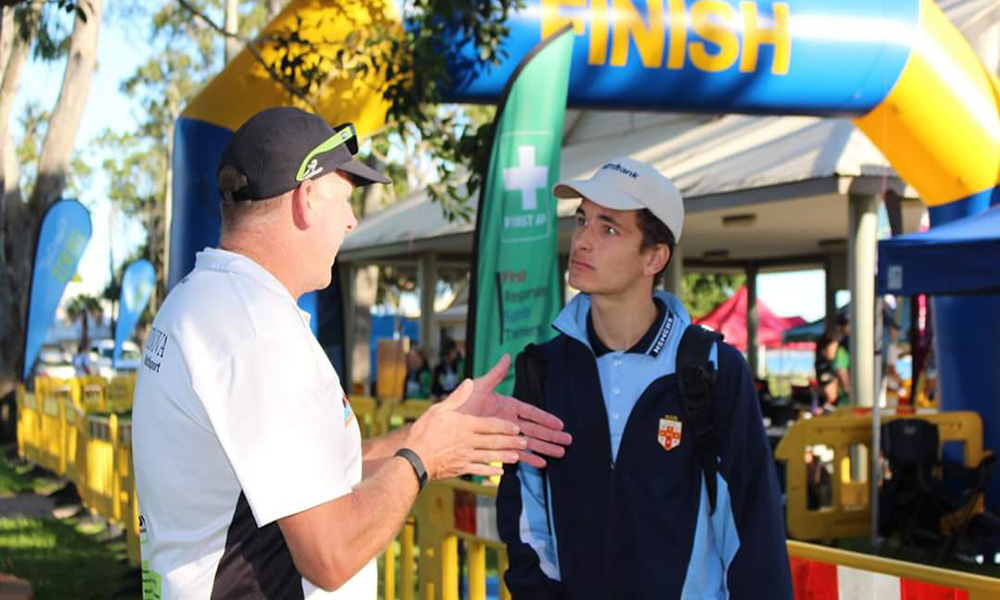 Lorcan Redmond
Lorcan Redmond Rod Cook and Lorcan Redmond at the 2016 School Sports Australia Triathlon.
It’s a gesture that is not lost on his athletes past or present, with many of them looking to him as a role model, as proof that there is a light at the tunnel and as a serious step towards erasing the stigma surrounding mental illness in sports.
“I think Rod has been amazing in obviously what he has had to deal with in the past and he has come out and is trying to help people who are in that situation or might end up in that situation at some time in the future,” Sexton said.
“To me that’s pretty brave to come out and say that at some point he suffered through that, something that is seen as among men and particularly male athletes as a weakness and it’s not.
“It’s just something that happens to people and he obviously recognises that and acknowledges that people need to ask for help if they are in that situation.”
Even his younger athletes understand the impact that this is making, with Longmuir commenting on how reassuring it is to know you can go through an experience like that and still have a stable support network in something like triathlon to fall back on, a sport that many do long into their 60’s and 70’s.
“Rod’s story just really motivated me to know I can get through those hard times, through mental and physical difficulties,” he said.
And while Cook’s most recent Ironman wasn’t his first since he was hospitalised after the attempt to take his own life it was one that had taken a couple of years to build up to, after a heart issue in 2014 related to the incident sidelined him.
“I was using Ironman as the goal to fund-raise towards, and then just putting in a few updates and the story,” he said.
“I have raced Ironman since my incident in 2009 but I just did it, not half-heartedly but I wasn’t as fit as I was now and then there was the heart issue which started to play up in 2014 so it has taken me a couple of years to come back.”
“I thought this would be good to give everyone an idea of the progression of getting back and getting fit and racing again.”
Yet as with all thing in life, even his 10th shot at the Ironman wouldn’t go completely to plan.
“I was on track to get it,” Cook said.
“The swim and bike went to plan but I didn’t realise until the run that I had picked up a shard of glass on the ground before the race that morning in the ball of my left foot.”
With his goal of 10 hours and 50 minutes still in mind he shifted his running style to put more pressure on the outside of his foot in an effort to avoid the annoying jab of pain that came with landing on the small piece of glass.
 Supplied
Supplied Rod Cook during the 2017 Ironman Triathlon held in Port Macquarie on May 7.
It was around the 30km mark, a mark that Cook had originally planned to pick up the pace, something he had been training for, when the real effects of that tiny shard started to kick in.
“I felt like I had the legs to go but every time I went to stride out and get quicker my left calf, knee and hip just gave me grief,” he said.
“I only missed going under the 11 hours by 10 minutes though so I’m not too disappointed.”
Regardless of the result, crossing the finish line that night to the sound of “Rodney, You, Are, An, Iron, Man” for the 10th time is a feat unto its own.
More than 2260 km raced over the past two decades as well as tens of thousands of training hours is also no small feat.
The dictionary defines Ironman as an athlete of remarkable endurance or durability, as a person of great physical strength and the ability to continue doing something difficult for a long period of time.
The dictionary definition of Ironman does not include overcoming great physical and mental struggle to achieve that goal, but looking at Cook one cannot help but think that perhaps it should.
When talking about what he took from his years of training with Cook, Sexton said it best.
“That balance that he instilled in me, obviously at times he wasn’t able to live that himself, but he passed that onto other people,” he said.
“It’s bigger than just him, himself.
“It is not just his own life that he was able to turn around.
“He has been able to have a massive positive influence on mine and no doubt on many others people in triathlon and beyond.”












